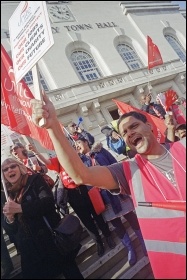Editorial of the Socialist issue 1159
Workers’ politics needed to exploit Tory scandal and splits
The proportion of voters, 63%, who think that capitalist politicians ‘are just in it for themselves’ is at its highest since the MPs’ expenses scandal in 2009. No wonder. The money-grubbing approach of many MPs was highlighted by Johnson’s hamfisted attempts to save the career of Tory MP Owen Paterson, who broke parliamentary rules to lobby for companies that paid him over £100,000 in 2020.
In total, a quarter of Tory MPs apparently can’t make ends meet on their £81,932 a year – which puts them in the top 5% of earners – and so have ‘second jobs’, often furthering the interests of big business; from private healthcare to gambling companies.
At the same time, it has now been confirmed that more than 46 contracts for PPE, worth over £5 billion, were handed out in 2020 to companies with ‘political or Whitehall connections’ without any proper checks. It wasn’t just Matt Hancock’s neighbour, but numerous others who made a fast buck via their mates in parliament. The Blairite ‘Labour’ MPs and the other capitalist politicians have no principled differences with their Tory counterparts on these issues but, being further away from power at this stage, are less likely to be considered by companies to be worth ‘hiring’.
The feeling that the Tories are just in it for themselves and their cronies is only heightened by the Christmas party farce. Government spokespeople are engaged in ludicrous twists and turns to avoid admitting that a Christmas party was held at Number Ten last year, when the rest of the population faced huge fines for breaking Covid rules, and were not even allowed to visit dying relatives in hospital.
Levelling down
This sleaze has been combined with the Tories’ total failure to deliver any ‘levelling up’ for working-class communities in the Midlands and North. In fact they’ve failed to even come up with any proposals, never mind implement them. Instead, they are implementing benefit cuts, public sector pay restraint, and tax increases, which will only further ‘level down’ working-class people. At the same time, public transport, far from being expanded as promised, is being slashed, with rail funding to be cut by 10% in 2022.
As the cost of living soars, anger at Tory austerity is growing. Sensing the social explosions ahead, the parliamentary Tory party is beginning to doubt that Johnson is the man to see them through. His popularity has plunged with voters. Only 29% of people think he is doing a reasonable job. The Paterson scandal, where he whipped them to vote for his mate, and then did a rapid U-turn, still rankles, because it exposed them to the anger of their constituents for no purpose.
At the fancy awards dinner, where the right-wing Spectator magazine gave out its 2021 prizes to various parliamentarians, the editor joked that they had had to exclude the obvious clear winner of the award for ‘who has done most to cause chaos for the government’. Had Boris Johnson been included, no other candidate would have had a look in.
Weak and divided
Despite its parliamentary majority, in reality this is a weak Tory government. It is split in numerous different directions, as the recent backbench rebellions on social care and mask wearing have indicated. Every section of the Tory party wants to act to defend the capitalist system, and attack the interests of the working class, but they do not agree on the best way to do it. From the scale of state intervention, to tax levels, to the ‘right’ level of austerity, the Tories are in conflict. It is not impossible, however, that they could unify on the need to ditch Boris Johnson, as he increasingly becomes a liability for them.
Why do these splits in the Tory Party matter for the workers’ movement? Firstly, because they point to the possibility of defeating this weak and divided government. For example, coordinated strike action against public sector pay restraint could force the Tories into a U-turn. So could determined strike action against the cuts to rail spending, which if implemented would mean major attacks on the pay, pensions and conditions of rail workers.
It is also important because it poses urgently the need for the working class to have its own voice in parliament. The capitalist class is more relaxed about the chaos in the Tory party than they would once have been, because they know that in Keir Starmer’s New Labour they have a reliable reserve team.
While Johnson was burbling about Peppa Pig to the big business CBI conference, Starmer made a speech that was music to their ears, emphasising “fiscal discipline”, “never spending money just for the sake of it”, and “stable government”, all thinly disguised code for acting in the interests of the capitalist class. He reiterated that Labour would leave the energy companies in private hands, and then drove the point home by removing Ed Miliband as business secretary.
Miliband is far from being on the left, but had had the temerity to reportedly support some form of public ownership of energy companies, so was ditched as part of a reshuffle that created an ultra-Blairite shadow cabinet.
Clearly, the capitalist class can rely on Starmer’s New Labour. The task facing the working class is to begin building a new mass workers’ party. The Socialist Party will support every step towards the workers’ movement founding such a party.
This includes standing candidates as part of the Trade Unionist and Socialist Coalition in next May’s local elections. It also includes encouraging as many trade unionists as possible to stand as anti-austerity candidates in those elections. And, of course, it includes arguing for workers’ representatives, when elected, to only take a workers’ wage, and to use their platform to fight for socialist policies.










